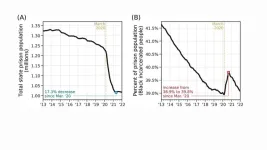(Press-News.org)
Deadly heatwaves fuelled by climate change in 2022 made almost 90 percent of Indians more vulnerable to public health issues, food shortages and increased risks of death, a new study from researchers at the University of Cambridge reported in PLOS Climate.
India currently uses a national Climate Vulnerability Indicator (CVI) to measure climate vulnerability and make plans for adaptation. The CVI includes many different socioeconomic, biophysical, institutional, and infrastructural factors. But it doesn't have a physical risk indicator for heatwaves, which is a key missing factor that would help policymakers consider how extreme heat actually impacts the Indian population.
The new study is the first to include a “heat index” to measure the recurring impacts of Indian heatwaves on the country’s population. The index measures how hot the human body feels relative to the surrounding conditions when humidity and air temperature are added together.
The study suggests that the CVI underestimates the main risks and threats of heatwaves to the Indian population because it does not include any kind of heat stress measure. This missing element also makes it harder to identify areas of the country, like Delhi and other larger urban areas that are most vulnerable.
“So, we could figure out how extreme heat really affects people and in which parts of the country,” said first author Dr Ramit Debnath, Cambridge Zero Fellow at the University of Cambridge. “A heat stress measure which identifies the impacts and the parts of India where the population is most vulnerable to recurring heatwaves would help to make state Heat Action Plans being created across India more effective.”
Some of those unidentified areas at the intersection of climate extremes and non-climate, structural and social-economic factors (shown by SDGs) may also be at risk of increased vulnerability to the impacts of extreme heat.
Researchers used publicly available data on state-level climate vulnerability indicators from the Indian Government’s National Data & Analytics Platform to classify severity categories. They then compared India’s progress on its SDGs over 20 years (2001-2021) with extreme weather-related deaths during the 20-year period from 2001-2021.
Results showed that India's global ranking according to the United Nations Sustainable Development Group has gone down in the last 20 years because it hasn't met the goals for 11 of the 17 UN Sustainable Development Goals, all of which were very important for SDG 13 (Climate Action).
Previous studies have shown that India’s frequent heatwaves are a growing burden on its economy and public health resources. Long-term predictions show that the heatwaves will affect more than 300 million people by 2050 and lower the quality of life for almost 600 million Indians by 2100. But there has not been enough focus on their short-term effects and the plans for dealing with heatwaves.
The study also found that not having a physical risk measure for heatwaves can slow progress in SDG 2 (Zero Hunger), SDG 3 (Good Health and Well-Being), SDG 5 (Gender Equality), SDG 8 (Decent Work and Economic Growth), SDG 9 (Industry, Innovation and Infrastructure), SDG 10 (Reduced Inequalities), and SDG 15 (Life on Land).
On a smaller scale, a case study of urban sustainability by the researchers found that residents of Delhi endured some of the most difficult conditions, with almost all of the National Capital Region (NCR) hitting danger levels on the index during a heatwave.
Co-author Dr Ronita Bardhan, Associate Professor of Sustainable Built Environment at University of Cambridge said: “Delhi’s heat vulnerability will exaggerate indoor overheating especially for those people in affordable housing who have fewer resources to cool themselves.
“Social cooling practices need to be understood to mitigate and adapt to heat-related health and energy burdens.”
Suggested Solutions
Improving Measurement: Policy action is needed to improve assessment of the multi-dimensional nature of climate vulnerability and how climate events affect SDGs.
Prevent overheating in low-income housing: This is a critical policy measure from an urban sustainability viewpoint that can promote resilient methods of mitigation and adaptation in cities like Delhi that are particularly vulnerable to heatwaves. See Video: https://youtu.be/KlF7kh_tDmQ
Build Partnerships: Building heatwave resilience would require strengthening partnerships with neighbouring countries on the Indian subcontinent.
International lessons: Learn from heatwave preparedness leaders like Australia, the U.S., the UK, and EU to create holistic heatwave plans.
This research was supported in part by the Bill and Melinda Gates Foundation, the Quadrature Climate Foundation, the Laudes Foundation, the Keynes Fund and the Africa Alborado Grant.
Reference:
Debnath, R., Bardhan, R., and Bell, M.L., (2023) Lethal heatwaves are challenging India’s sustainable development, PLOS Climate, DOI:10.1371/journal.pclm.0000156 https://journals.plos.org/climate/article?id=10.1371/journal.pclm.0000156
END
There is a growing body of evidence that iron in the brain may play a role in Alzheimer’s disease. Lending weight to that idea, a new imaging probe has for the first time shown that in the same regions of the brain where the amyloid beta plaques associated with Alzheimer’s occur, there is also an increase in iron redox, meaning the iron in these regions is more reactive in the presence of oxygen. Their imaging probe could yield even more details about the causes of Alzheimer’s and help in the search for new drugs to treat it.
A ...
TAMPA, Fla. (APRIL 19, 2023) – The search for the 2022 killer that decimated the long-spined sea urchin population in the Caribbean and along Florida’s east coast is over. A team of researchers organized by Mya Breitbart, Distinguished University Professor at the University of South Florida’s College of Marine Science, identified a single-celled organism called a ciliate as the cause of a massive die-off event to a marine animal vital to coral reef health.
Their findings were reported in Science Advances.
“We’re beyond ...
APRIL 19, 2023
As Covid roared through prisons in 2020, the U.S. prison population fell by as much as 30 percent, creating the largest, fastest reduction in prison population in American history. But this decarceration disproportionately benefited white incarcerated people, sharply increasing the fraction of incarcerated Black and Latino people. A new study in Nature shows that this increased racial disparity in U.S. prisons stems in large part from a long-standing problem with the justice system: Non-white people tend ...
HOUSTON ― The University of Texas MD Anderson Cancer Center’s Research Highlights showcases the latest breakthroughs in cancer care, research and prevention. These advances are made possible through seamless collaboration between MD Anderson’s world-leading clinicians and scientists, bringing discoveries from the lab to the clinic and back.
Recent developments include effective combination therapies for patients with BRAFV600E mutations, an approach to identify cancer biomarkers in extracellular vesicles, therapeutic strategies for improving ...
COLUMBUS, Ohio – As climate change causes ocean temperatures to rise, one of Greenland’s previously most stable glaciers is now retreating at an unprecedented rate, according to a new study.
Led by researchers at The Ohio State University, a team found that between 2018 and 2021, Steenstrup Glacier in Greenland has retreated about 5 miles, thinned about 20%, doubled in the amount of ice it discharges into the ocean, and quadrupled in velocity. According to the study, such a rapid change is so extraordinary ...
The Container Store, the nation’s leading retailer of storage and organization solutions, custom spaces, and in-home organizing services, will fund $10,000 in scholarships for Charisma™ Virtual Social Coaching, a strengths-based social skills training developed by Center for BrainHealth.
Charisma is a personalized, avatar-driven program that provides real-time, unscripted social coaching in a safe, non-threatening virtual environment. Drawing on extensive cognitive neuroscience research, this program is demonstrated to help people with social challenges to ...
A study led by Oak Ridge National Laboratory researchers identifies a new potential application in quantum computing that could be part of the next computational revolution.
The study surveys techniques for compressing data generated by sensors in edge computing — which processes data at or near sensors — and compares classical techniques with quantum approaches, which are mostly in development. Compressing data saves storage space and network bandwidth.
Classical computing stores information in bits equal to 0 or 1. Quantum computing stores information in qubits, which can exist ...
A treatment combining two antibodies against the coronavirus SARS-CoV-2 strongly protected high-risk people with early COVID-19 symptoms from hospitalization and death in an international Phase 2/3 clinical trial conducted in the first half of 2021 and co-led by researchers at Weill Cornell Medicine and NewYork-Presbyterian.
The trial, described in a paper appearing online Apr. 18 in Annals of Internal Medicine, enrolled more than 800 non-hospitalized patients with COVID-19 at high-risk of progression of the disease in the United States and ...
WASHINGTON, D.C.—April 19, 2023—The U.S. Department of Veterans Affairs (VA), the largest integrated healthcare system in the nation, today announced that 60 of its 111 emergency departments have earned Geriatric Emergency Department Accreditation (GEDA) from the American College of Emergency Physicians (ACEP). Another 11 departments are on track to earn the designation in coming months and the VA has plans to expand the program to the majority of its hospitals over the next three years.
Geriatric emergency departments provide specialized care to older veterans and their families during and after a ...
A planetary scientist at NAU is part of a Japanese Aerospace Exploration Agency (JAXA) mission to travel to Mars and survey the planet’s two moons, including collecting a sample from one and returning it to Earth.
Christopher Edwards, an associate professor in the Department of Astronomy and Planetary Science, received a six-year, $650,000 grant for the Martian Moons eXploration (MMX) mission awarded by NASA. This goal is to send an uncrewed spacecraft to Mars’ two moons, Phobos and Deimos, to gather information about them. It also will collect surface material from Phobos, a first-of-its-kind attempt.
Edwards, ...



